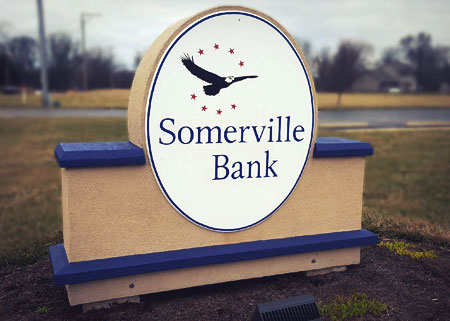“Small businesses are the heart of a community. They build jobs, opportunities, and local pride. Every great small business – from the owner of a corner café to the hardware store that is family-owned – starts with a dream. But turning that dream into reality often requires more than passion; it takes financial partnership.

What is a Small Business?
A small business is one that identifies as “for-profit” and is privately owned. It is considered to have independent operations and is not considered to be nationally dominant in its field. There are specific criteria that is used by the Small Business Administration to determine the size of a small business.
In most cases, the employees total 500 or less or they make less than $7.5 million in revenue each year. State-chartered banks are uniquely positioned to help small businesses succeed because they combine financial expertise and deep community ties and local decision-making.
Why are Small Businesses Are the Backbone of Local Economies
In the United States alone, small businesses are considered to be a critical component of the economy. It has been determined that these types of businesses drive job creation, high levels of innovation, and overall growth of the economy. When operated in small local areas, they aid in keeping money flowing through that community.
Small businesses encourage entrepreneurship. They offer a large variety of services such as varied products and associated services. These businesses provide a pathway, too, for individuals that are planning to follow a path for advancements in their career and developing their skills. They create ripple effects that include more local jobs, a stronger tax base, and a highly vibrant identity as far as the community is concerned. When these businesses experience success, the entire state of operation benefits.
The State-Chartered Bank Advantage
A state-chartered bank is a commercial bank that receives its charter to operate from a state government agency and not a federal government agency. The agency for the state that monitors these types of banks, and they may be monitored by the Federal Reserve System; that is, if they are members of this system and/or the Federal Deposit Insurance Corporation (FDIC). In the United States, banks may choose between a state charter and a federal charter. If a federal charter is preferred, it must be granted by the Comptroller of the Currency.
Those state-chartered banks are familiar with the local markets, the industries, and the challenges faced by those markets. The decisions of the bank are made under local and/or state oversight; federal chartered bank systems are dictated by headquarters that are far away. Relationship banking is also achieved at a high level.
In local state-chartered banks, the relationships shared with clients are significantly stronger than with standard banks. These banks know their clients by name and are knowledgeable about the businesses that their clients run. These banks have a higher level of community focus than bank chains. The state-chartered banks are rooted in serving certain, specific regions. They are able to highlight their level of flexibility and the ability to offer personalized solutions compared to those banks that are just online or are national chains.
Key Financing Options for Small Businesses
State-chartered banks are able to offer numerous key financing options for small businesses. The most popular options are listed below, with a brief explanation of each:
- SBA Loans – This is a small business loan that is considered to be partially guaranteed by the Small Business Administration (SBA) in the United States. It is typically issues by a private lender – such as a credit union or a bank. While not directly issues by the SBA, this type of loan helps businesses with various types of financing for several different purposes. Examples include startup expenses, purchases, and/or working capital. To obtain this type of loan, the business needs a very strong credit history, a thorough business plan, and to provide financial documents that are highly detailed.
- Term Loans – Term loans for businesses are loans that provide a designated lump sum of money that will need to be repaid over a fixed period of time – such as five years or longer. Most of the time, a business will use this type of loan to make one-time costly purchases. Examples of these purchases include equipment, real estate, or an expansion. To qualify, the business applying should have a good credit history, a steady revenue source, and a financial record that is completely solid.
- Lines of Credit – Business lines of credit provide a highly flexible and revolving access to working capital and needs that are short-term in basis. It allows a business to take what they need, as they need it and then repay them – which will allow the business to access to credit lines that may be consistently drawn from.
- Commercial Real Estate Loans – These loans are perfect for purchasing and/or improving pieces of property that are or will become part of a business.
- Microloans and Specialty Programs – These financial products are designed to help in the start up of a business or for entrepreneurs that are underserved. Simply inquire about these programs through a state-chartered bank and you will be amazed at what is available.
Real Stories, Real Impacts
There are numerous stories online about real people with real stories that have been positively impacted by state-chartered banks. For example, a family who owed and operated was capable or expanding to a second location with the services offered by state-chartered banks.
State-chartered banks do not simply provide funds, they also provide mentorship, guidance, and directions to businesses. Additionally, they place a high level of importance on developing long-term and close relationships with the clients that they serve. The banks take great pride in seeing each business that they work with in becoming successful and playing a large role in the state’s overall economic fabric. If you want to work with a bank that treats you and your business as a top priority, you should opt for a state-chartered bank, such as us here at Somerville Bank.
Beyond The Loan – Other Ways State-Chartered Banks Support Small Businesses
There are numerous ways that state-chartered banks support businesses. These include but are not limited to the following:
- The State-chartered banks offer financial education to the clients that they serve. This could be in terms of webinars, workshops, mentoring, and even one-on-one advising.
- The banks offer networking opportunities for their clients. Examples include sponsoring of local businesses, associations, and even chambers of commerce.
- There are cash management systems offered by state-chartered banks. These include – but are not limited to – merchant services, payroll, and tools that ensure fraud protection.
- State-chartered banks also offer local advocacy for both entrepreneurs and small businesses within the state where they serve.
Practical Tips for Entrepreneurs Seeking Financing
If you are an entrepreneur that is in search of financing, Follow the practical tips outlined below:
- You may start by preparing a business plan and be sure to include financial projections.
- You should understand what your credit profile looks like.
- It is best to meet with and develop a relationship with your banker before you require any funds.
- When working with the bank, be sure to make sure that you are open and honest about challenges that you face in your business. If you are honest and proactively communicate, you will find that the bank is more willing to help you.
- You should look at the bank as a business partner and not just a lender.
Conclusion
We here at Somerville Bank thank you for reading through our guide about state-chartered banks such as ourselves. State-chartered banks are more than just lenders; they are community partners who are passionate about and believe in the dreams of local businesses. Your vision for your business deserves a partner who understands your business and your community. Together, we here at Somerville Bank and your business can keep dreams alive and thriving in your community. Visit Somerville Bank today and meet with a business banking specialist to take the first steps towards your business dream.
Who Is Somerville Bank?
Somerville Bank is a state-chartered bank that offers many unique services to our clients. These include mobile banking, Zelle, online bill pays, account access 24/7, Mobile check deposit, account notifications, tax documents, and stop payment requests. Soon, an all-new look and a digital banking system will be integrated into Somerville Bank. We are your one-stop shop for all business-related banking needs.
In addition to this, we also offer credit cards, identity theft services, online banking, checks, and switch kits. We offer 8 convenient locations. If you are ready to harness the power of solutions that we offer for businesses, and would like to achieve specific business goals, we can help you. You may visit one of our locations or give us a call and one of our locations to learn more. You may click on the following link to find a location nearest to you: https://somervillebank.net/locations/

 Somerville Bank has 8 Locations
Somerville Bank has 8 Locations